Table of Contents
Overview
In the ever-evolving landscape of AI-powered tools, the ability to replicate human voices with stunning accuracy is becoming increasingly accessible. Enter AI Voice Cloning, a platform that promises to clone voices with high fidelity and emotional nuance in a mere three seconds. This remarkable speed, combined with its focus on natural tone and expressiveness, positions it as a compelling option for anyone seeking realistic voice synthesis. Let’s dive into a comprehensive review of AI Voice Cloning and explore its capabilities.
Key Features
AI Voice Cloning boasts several key features that set it apart from the competition:
- 3-Second Voice Cloning: The platform’s standout feature is its ability to clone a voice from a sample as short as three seconds. This rapid processing significantly reduces the time investment required for voice replication.
- Emotionally Rich Output: AI Voice Cloning emphasizes the generation of voice outputs that convey a wide range of emotions, adding depth and realism to the synthesized speech.
- Realistic Tone and Pitch: The platform prioritizes the accurate replication of the original voice’s tone and pitch, ensuring a natural and authentic sound.
- Free Core Model Access: Users can access the core voice cloning model for free, allowing them to experiment with the technology and assess its suitability for their needs.
- Fast Processing: Beyond the initial cloning, the platform offers fast processing for generating speech from custom scripts in the cloned voice.
How It Works
The process of using AI Voice Cloning is straightforward and user-friendly. First, users upload a short voice sample – ideally, a clear recording of someone speaking. The AI then analyzes this sample to model the speaker’s unique tone, pitch, and speaking style. Once the voice is cloned, users can input custom scripts, and the platform will generate speech in the cloned voice. This allows for the creation of personalized voiceovers, virtual assistant responses, and more.
Use Cases
The applications of AI Voice Cloning are diverse and span various industries:
- Voiceovers for videos and podcasts: Create engaging and personalized voiceovers for your content without the need for professional voice actors.
- Personalized virtual assistants: Develop virtual assistants that sound like a specific person, enhancing user engagement and creating a more intimate experience.
- Audio content localization: Easily adapt audio content for different languages while maintaining the original speaker’s voice, ensuring consistency and brand identity.
- Accessibility tools: Create personalized text-to-speech solutions for individuals with disabilities, allowing them to access information in a voice that is familiar and comfortable.
- Gaming character voices: Develop unique and expressive voices for gaming characters, adding depth and immersion to the gaming experience.
Pros & Cons
Like any technology, AI Voice Cloning has its strengths and weaknesses. Let’s examine the advantages and disadvantages:
Advantages
- High realism: The platform produces voice outputs that are remarkably lifelike, capturing the nuances of human speech.
- Fast cloning: The 3-second cloning time is a significant advantage, allowing for quick and efficient voice replication.
- Emotionally expressive: The ability to generate emotionally rich voice outputs adds depth and authenticity to the synthesized speech.
- Free to start: Access to the free core model allows users to explore the platform’s capabilities without any initial investment.
Disadvantages
- Ethical considerations: The technology raises ethical concerns regarding the potential for misuse, such as creating deepfakes or impersonating individuals.
- Limited voice training time: While the 3-second cloning is fast, more complex or nuanced voices might benefit from longer training times.
- Potential for misuse: As with any powerful technology, there is a risk of misuse, which requires responsible development and implementation.
How Does It Compare?
When comparing AI Voice Cloning to its competitors, several factors come into play. ElevenLabs is known for its strong realism, but its cloning time is generally slower than AI Voice Cloning. Resemble.ai offers flexible APIs for integration into various applications, but its emotion depth may not be as pronounced as AI Voice Cloning. AI Voice Cloning distinguishes itself with its combination of rapid cloning, emotional expressiveness, and realistic output, making it a compelling choice for users seeking a balance of speed and quality.
Final Thoughts
AI Voice Cloning presents a compelling solution for anyone seeking to replicate human voices with speed and accuracy. Its emphasis on emotional nuance and realistic tone, coupled with its rapid cloning time, positions it as a valuable tool for a wide range of applications. While ethical considerations and the potential for misuse must be carefully addressed, the platform’s capabilities offer exciting possibilities for content creation, accessibility, and more. As the technology continues to evolve, AI Voice Cloning is poised to play a significant role in shaping the future of voice synthesis.
